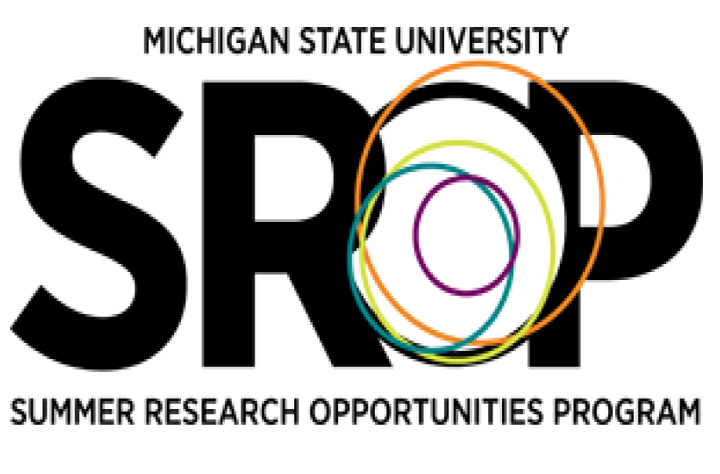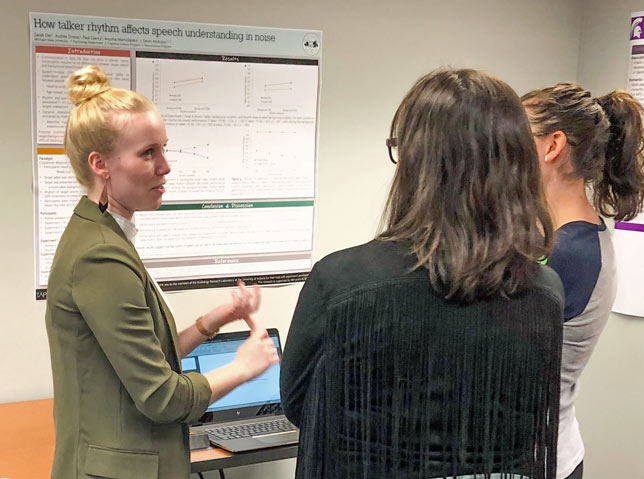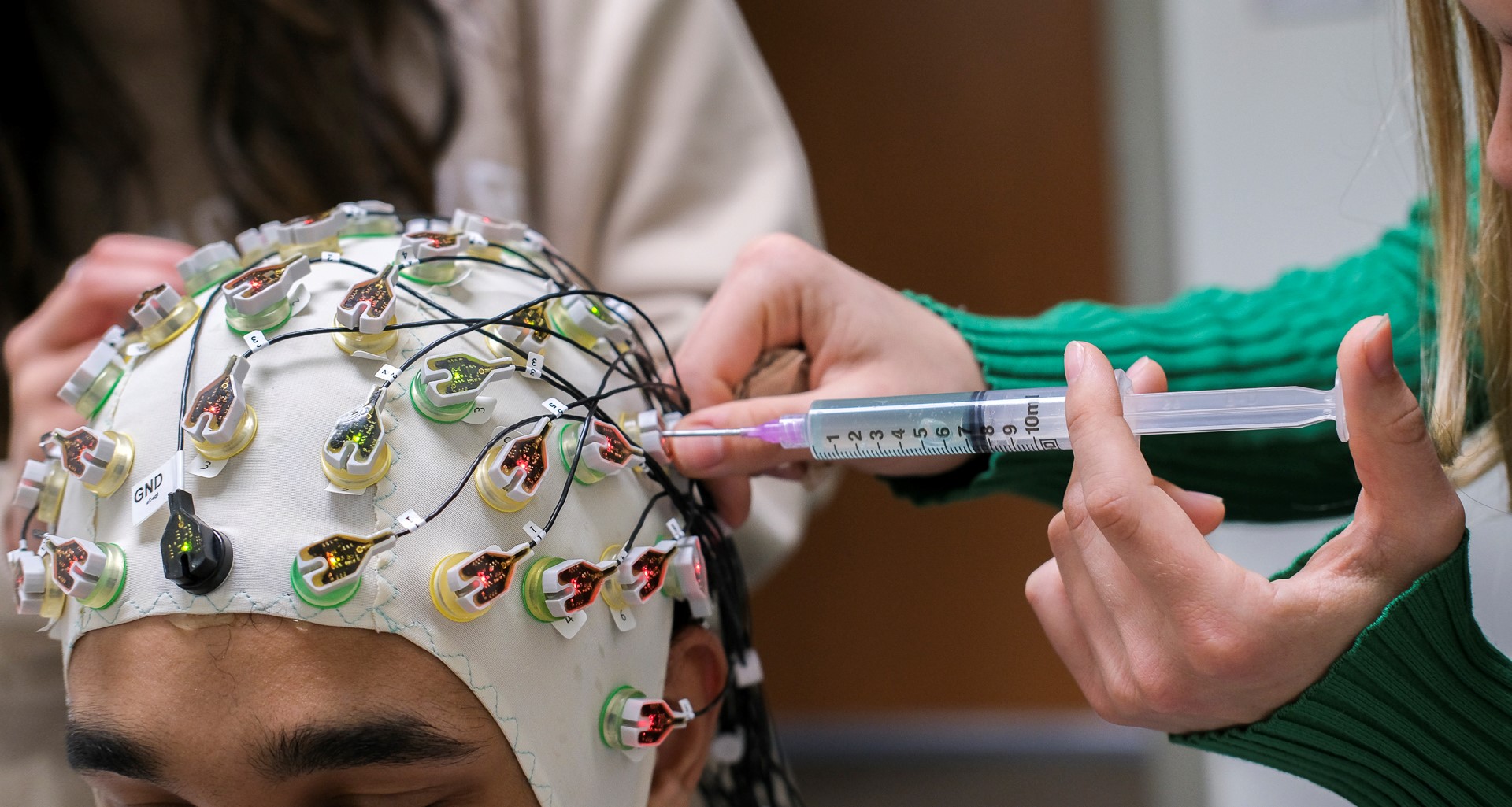Research Experience
Why become involved in research?
- Research experience is extremely important for graduate school applications
- Research enhances your understanding of concepts in psychology courses
- Being in a lab helps you get to know other people who have similar interests
- Research is challenging but rewarding!
Students are encouraged to become involved in research in the psychology department. These experiences give students great opportunities to work with faculty and graduate students in the research environment. There are many opportunities to join labs in each of our six areas of interest as either a volunteer or for credit (via PSY 490 or PSY 491).
There are many opportunities to join labs in each of our six areas of interest: Behavioral Neuroscience, Clinical Science, Cognition & Cognitive Neuroscience, Ecological / Community Psychology, Social / Personality Psychology, and Organizational Psychology. To find out more about the labs in our department please click the photos below.
-
How to Locate Research Opportunities
There are opportunities in the Department of Psychology for students to get involved in a faculty member's research lab, either as a volunteer or for credit (via PSY 490 or PSY 491). The following are ways to identify these opportunities:
- Expand the AVAILABLE RESEARCH POSITIONS section (2 sections below) and review the postings for labs actively seeking new students.
- Explore current research labs categorized by the six areas of interest.
- Use the directory to search and learn about psychology faculty and their research interests. Many of the lab websites include recent publications that students can read prior to contacting the faculty. After reviewing their information, students can contact those that most closely resemble their interests.
Students should use the above methods to appropriately connect with faculty to show interest in joining their research lab. Some listings will offer an application process while others will require you to send a well-crafted email indicating your interest in joining a research lab.
If accepted into a research lab or project the student should communicate with the primary investigator or lab manager about the opportunity to earn credit or continue as a volunteer. Please review the below options for more information
-
Independent Studies: Research for Credit
Independent Studies: Research For Credit
Independent studies are important for students planning to apply for graduate school. This experience gives students great opportunities to work with faculty in the research environment. Research credit can be earned through PSY 490 or PSY 491.
PSY 490 Special Problems in Psychology (fall, spring, summer)
Description: Students work under the direction of a faculty member on an experimental, theoretical, or applied problem. This is a graded course.
Restrictions: As specified by the faculty of record. A maximum of 1 - 8 490/491 credits can be taken in a semester with a combined total of 12 independent study credits for the degree. Needs instructor and departmental approval.
PSY 491 Participation in Psychological Project (fall, spring, summer)
Description: Students participate in a psychological project under direction of a faculty member. This is a pass/no grade course (no grade, only credit).
Restrictions: As specified by the faculty of record. A maximum of 1 - 8 490/491 credits can be taken in a semester with a combined total of 12 independent study credits for the degree. Needs instructor and departmental approval.
- Earning independent study credits through PSY 490/491 can count toward PSY elective credits and the College of Social Science Experiential Learning requirement (minimum of 3 credits needed).
- Restrictions: As specified by the faculty of record. A maximum of 1 - 8 490/491 credits can be taken in a semester with a combined total of 12 independent study credits for the degree. Needs instructor and departmental approval.
- Click here for Independent Study Form When filling out form remember to include whether you will be participating in either 490/491 for course credit.
*NOTE College of Social Science Restrictions on Experiential Learning*:
A maximum of 12 credits of independent study may be applied toward the degree.
A maximum of 12 credits in internship, field experience, and practicum courses combined may be applied toward the degree.
The total of independent study, practicum, internship, and field experience credits may not exceed 20 credits combined. Participation in PSY 371/372 (6 cr.) and PSY 381 (3 cr.) will NOT be counted against this limit. If you have any questions, contact your advisor.
Volunteer:
Being an undergraduate research assistant does not always require students to enroll in credits. Reasons students do not enroll for credits are:
- Some labs require a multiple semester commitment before offering independent study credit.
- Student does not need the credit for a degree requirement. -
Available Research Positions
(12-11-25) Seeking Research Assistants/Students for Independent Study on Replication in Psychology
Looking for an experiential learning opportunity or research experience that will bolster your resume? The Close Relationships Lab is sponsoring a Psych 490 section that provides a hands-on experience conducting a replication study in psychology. You’ll learn about all aspects of the research process, from ethical review, to designing studies, to analyzing and reporting data in various formats. The experience will culminate in a group presentation at an undergraduate research fair in April 2026. Most of the work is remote, but you will be required to attend a meeting on Mondays from 3:00-4:30pm. Students are expected to enroll in Psychology 490 for three credit hours. This experience will be capped at 20 students and the link below will become inaccessible when this limit has been reached.
Questions and more information? Please fill out the application below, which will provide more information about how to enroll and some additional details about the experience.
https://msu.co1.qualtrics.com/jfe/form/SV_eVe3sRk1jAiHaJ0
(10-8-25) Seeking RA positions for CBCC Lab
Are you a current Michigan State undergraduate student? Are you interested in working in a research lab? Undergraduate research assistants in the Computational Basis of Cognitive Control Lab will have an opportunity to participate in a variety of research activities and learn firsthand how research is conducted, offering great learning experiences for undergraduate students. The CBCC lab’s mission is to understand the computational principles that allow us to encode new memories and search for existing memories. We are looking for students with computer programming experience to help develop computer models of memory using behavioral and EEG data.
Requirements:
· Minimum GPA: 3.5
· 5-10 hours a week time commitment for 2 semesters
Questions or to apply:
If you have any questions or would like to apply, email Dr. Karl Healey: khealey@msu.edu(10-1-2025) Seeking Undergraduate Research Assistant
RA responsibilities in the lab vary based on need and training. RAs may be asked to help with recruitment, data entry, literature searches, videotaping participants in their school or home, and scoring or coding videotaped assessments. Students in their first year in the lab will be involved in an ongoing project during which time they will be introduced to the type of questions we ask in the lab. Students who work for additional semesters may have the opportunity to become involved in the design of new projects, take a lead training role with new RAs, or help graduate students prepare publications. Many of our undergraduate RAs have completed research poster presentations, too!
Requirements:
• 3.2 GPA or higher
• Freshman or Sophomore status preferred
• Ability to speak Spanish preferred
• Experience with kids preferredResponsibilities:
• Drive to multiple cities in the state
• Interact with study participants
• Video Editing
• Video Coding
• Toy cleaning
• Attend monthly meetingsQuestions: Email: autlab@msu.edu
Website: https://autismlab.psy.msu.edu/
Recruitment Flyer -
Funding Research
The College of Social Science has various scholarships and grants that can assist undergraduates in furthering their research interests.
*There are occasional cases that research labs or projects have funds to provide undergraduate. If this is available it will be communicated by the primary investigator of the lab or project.
-
Presenting Your Research
There are plenty of opportunities for undergraduates to gain research experience in a lab and learn how to present research to a broader audience.
Click here to learn more about the Undergraduate Research and Creative Activity (URCA) Office at Michigan State University.
-
Summer Opportunities
Off Campus Summer Opportunities
Summer research opportunities exist at institutions outside MSU. Often, psychology faculty receive postings and flyers from colleagues at other schools and pass them onto the advisors. These summer opportunities can help students get research experience for graduate school as well as help connect them to faculty outside MSU.
Check out the link to learn about programs that are available and learn how to apply. Many of these programs will also be available in future summers so if you are not ready to do them yet, you should still look these over!
Summer Research Opportunities Program

The Summer Research Opportunities Program (SROP) is a gateway to graduate education at Big Ten Academic Alliance universities. The goal of the program is to increase the number of underrepresented students who pursue graduate study and research careers. SROP helps prepare undergraduates for graduate study through intensive research experiences with faculty mentors and enrichment activities.
Learn more about SROP here: https://grad.msu.edu/srop
-
Post Graduation Research Positions
Click here to check out open research positions in the post graduate category and for undergraduates.
-
UURAF
In April each year, our undergraduate researchers present their work at MSU's Undergraduate Research and Arts Forum (UURAF).
 UURAF SSHA Grand Prize Winners
UURAF SSHA Grand Prize WinnersA group of four students won the UURAF Social Science, Humanities and Arts Grand Prize award for their research in Professor Devin McAuley's TAP Lab. Their project, “How Talker Rhythm Affects Speech Understanding in Noise", examined the role of talker rhythm in understanding speech under difficult listening conditions.
Explore more here:


